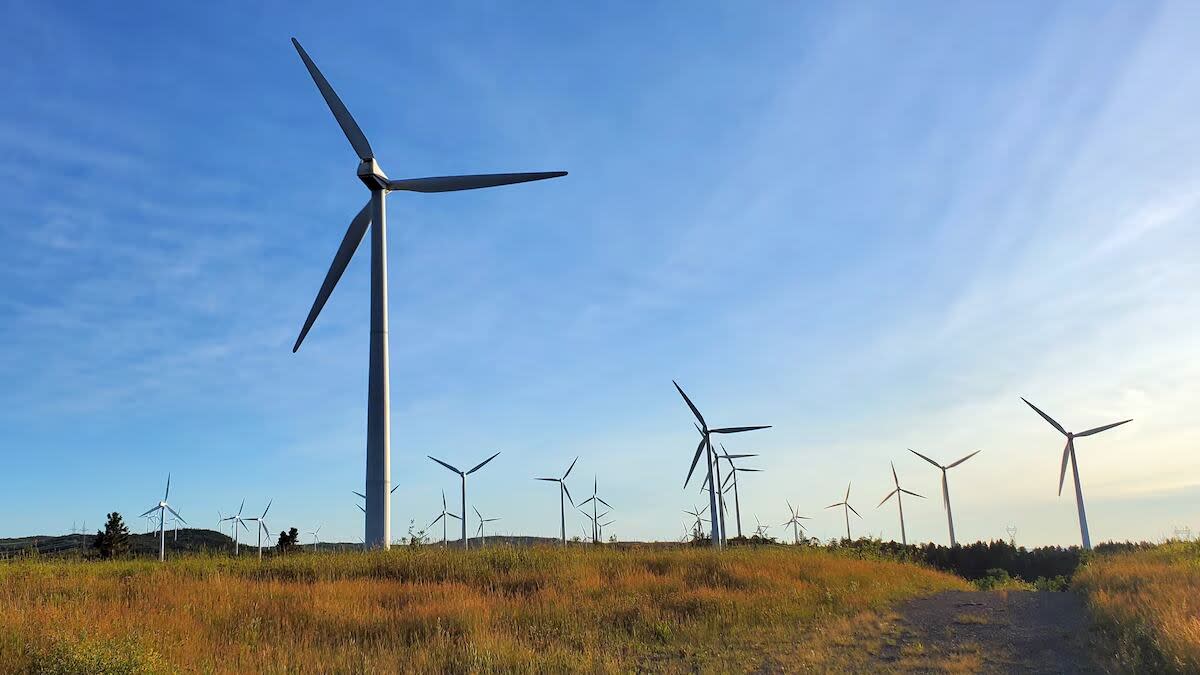Hydro-Québec will develop large-scale wind farms to meet growing energy demand

Hydro-Québec announced Thursday that it will begin constructing and operating wind farms, an activity that had previously been reserved for the private sector.
The Crown corporation aims to add 10,000 megawatts of new wind capacity to its network by 2035. This is more than the installed capacity of the Manic-Outardes complex in northern Quebec, which has seven hydroelectric power stations with a combined capacity of 7,565 megawatts.
Hydro-Québec forecasts more than 20 per cent in savings with this new energy capacity, which it says is important to help keep Quebecers' rates low and competitive.
To achieve this, Hydro-Québec is presenting a new strategy where it will become the main contractor and shareholder of all wind projects over 1,000 megawatts. This will be done in close collaboration with First Nations and municipalities, who will also become shareholders in these projects, the corporation has vowed.
Up to now, wind development has been done through relatively small projects, typically between 20 and 350 megawatts, carried out by private developers through calls for tenders.
Hydro-Québec's role was essentially limited to purchasing the energy at the end of the process, explained Hydro-Québec CEO Michael Sabia at a news conference.
"The world has changed a lot, and our energy context has changed a lot. Today, wind power is an essential part of the diversification of our system," he said.
With the advent of electric cars, the battery industry and the decarbonization of human activities, wind power allows Hydro-Québec to quickly meet significant future electricity needs without emissions at a lower cost than hydroelectricity or nuclear power, he said.
"Projects of scale are necessary to achieve economies of scale," said Sabia.
The utility company says each site will need several hundred wind turbines to reach 10,000-megawatt capacity.
As a comparison, one of the largest wind farms in Canada, the Seigneurie de Beaupré wind farm about 80 kilometres east of Quebec City, currently has 164 turbines for an installed capacity of 364 megawatts.
Unprecedented size and scale
To reach 10,000 megawatts, Hydro-Québec's wind projects will be of an unprecedented size and scale for Canada, and this is why social acceptability is important, Sabia said. Hydro-Québec is focusing on vast, open spaces in the north of the province where such infrastructure will have minimal impact on communities.
On X, formerly Twitter, Quebec Liberal MNA Greg Kelley, the Official Opposition critic for energy, said his party welcomes Hydro-Québec's plan.
"Having Hydro-Québec as the prime contractor for large-scale wind development projects will enable planning and predictability that will be beneficial for achieving the objectives of its plan," he said.
Also on X, Alice-Anne Simard, head of the environmental advocacy group Nature Québec, said her organization applauds the wind strategy.
She said the corporation is "finally getting on the right track to ensure coherent wind development in the region by limiting impacts on natural environments and communities as much as possible."
No monopoly on wind
Last March, Hydro-Québec announced plans to build facilities that will eventually produce more than 1,500 megawatts of wind energy across Quebec in collaboration with private developers.
Despite taking the lead on future major projects, Hydro-Québec insists it is not establishing a monopoly on wind energy production in Quebec.
The company states that private developers will still be involved in smaller-scale projects. These projects, similar to those developed over the past 20 years, will have installed capacities of up to 350 megawatts.
Additionally, Hydro-Québec emphasizes that it will ensure the communities involved in wind development are supportive of hosting such projects.
"Without community acceptance, there will be no project, period," Sabia said.
Sabia said this approach is the only way to make energy available in a socially acceptable manner, as quickly as possible and at the best cost, to decarbonize Quebec's economy and create wealth.

 Yahoo News
Yahoo News 
